Clear2O Water Filter Alternatives

Shop Our Products
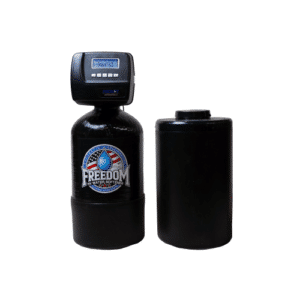
Freedom RV Water Softener System
Specifically for RV and fifth-wheel owners, this high-quality system guarantees your RV’s water is pure,
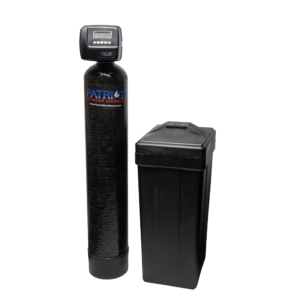
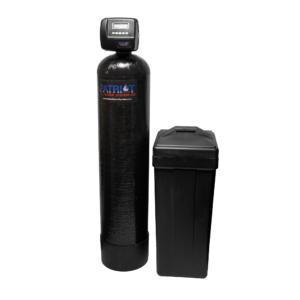
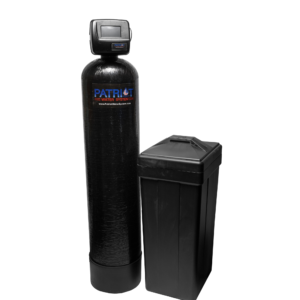
When you’re traveling in your RV, having clean and safe water is really important. But when it comes to water quality, many RV owners get confused between water filters and water softeners. These two systems are different, and it’s important to understand what each one does.
Clear2O is a well-known brand that offers RV water filters. These filters are great for getting rid of things like dirt, bad smells, and chemicals in your water. But they don’t fix the problem of hard water, which can cause scale buildup in your RV’s plumbing and appliances. That’s where water softeners come in, like the ones we offer at Patriot Water System.
In this guide, we’ll dive into the differences between water filters and water softeners, explore the Clear2O product line, and recommend alternatives that might be better for your needs. We’ll also explain when you should use a water filter, when a water softener is the better choice, and when it’s best to use both. Our goal is to help you choose the right system for your RV so you can enjoy the cleanest and softest water possible on your travels.
Understanding Water Filters
Different types of filters target specific impurities.
- Sediment Filters: These filters remove particles like dirt, sand, and rust. The effectiveness is measured in microns, with a 10-micron filter catching larger particles and a 1-micron filter catching much finer particles.
- Carbon Filters: These filters are designed to remove chlorine, organic contaminants, and other chemicals that affect water’s taste and smell.
- Reverse Osmosis (RO): This method uses a semi-permeable membrane to remove a broader range of contaminants, including heavy metals and dissolved salts.
How Water Filters Work
Water filters operate through different methods depending on their type.
- Sediment Filters work by physically blocking particles from passing through based on their size.
- Carbon Filters use activated carbon, which traps contaminants as water passes through.
- Reverse Osmosis forces water through a special membrane, which blocks contaminants at a molecular level, providing thorough purification.
Benefits Of Using Water Filters
Using water filters in your RV offers several key benefits:
- Improved Safety: Filters remove harmful substances such as chemicals and microorganisms, making the water safer to drink.
- Enhanced Taste and Odor: By removing chlorine and other contaminants, filters improve the taste and smell of your water.
Water Filter Limitations
While water filters are effective at removing many contaminants, they have some limitations like;
- No Effect on Water Hardness: Filters do not remove minerals like calcium and magnesium, which cause hard water and lead to scale buildup in plumbing and appliances.
- Flow Rate Reduction: As filters trap contaminants, they can slow down the water flow, reducing water pressure in your RV.
- Selective Contaminant Removal: Not all filters remove every type of contaminant. For example, while carbon filters are great at removing chlorine, they might not be effective against bacteria or viruses without additional treatment.
- Inability to Remove Dissolved Solids: Filters like carbon or sediment filters are not effective at removing dissolved minerals or salts, which could affect water quality in different ways.
- Cost Over Time: While individual filters may not be expensive, the need for regular replacement can add up over time, increasing the overall cost of maintaining clean water.
Understanding Water Softeners
Water softeners are devices designed to remove hardness minerals, such as calcium and magnesium, from your water. These minerals are the primary cause of limescale buildup, which can damage plumbing, reduce the efficiency of appliances, and leave spots on dishes and surfaces. By softening the water, these systems help prevent these issues, making water gentler on your plumbing and appliances.
Water softeners range in price from around $100 to over $1000. Read our cost comparison guide to find the right unit for you.
How Water Softeners Work
Water softeners work through a process called ion exchange:
- Ion Exchange Process: Hard water passes through a tank filled with resin beads. These beads are coated with sodium ions. As the hard water flows over the beads, the calcium and magnesium ions (which cause hardness) are swapped with sodium ions, effectively removing the hardness minerals from the water.
- Resin Beads: The resin beads are the heart of the softener, trapping the hardness minerals and releasing sodium ions in their place. Over time, the beads become saturated with calcium and magnesium and need to be regenerated using a saltwater solution, which flushes the hard minerals out and recharges the beads with sodium.
Key Points of Ion Exchange:
- Removes: Calcium, magnesium, and, in some cases, iron from water.
- Results: Softer water that reduces limescale buildup in plumbing and appliances.
Benefits
Using a water softener in your RV provides several significant benefits:
- Prevention of Scale Buildup: By removing calcium and magnesium, water softeners prevent limescale from forming in your pipes and appliances, extending their lifespan.
- Protection of Appliances: Soft water reduces the wear and tear on appliances like water heaters, washing machines, and dishwashers, helping them run more efficiently and last longer.
- Improved Cleaning Efficiency: Soft water allows soaps and detergents to lather better, making cleaning more effective and leaving fewer spots and residues on dishes and surfaces.
Limitations
While water softeners are effective at addressing hard water issues, they do have some limitations:
- Do Not Remove Other Contaminants: Water softeners are designed to tackle hardness minerals, but they do not remove other contaminants like sediment, chlorine, or microorganisms. For comprehensive water treatment, additional filtration systems may be required.
- Salt Usage: The ion exchange process requires regular salt replenishment, which can add to maintenance costs and effort.
- Potential Sodium Increase: The exchange of calcium and magnesium for sodium can slightly increase the sodium content in your water, which may be a concern for people on low-sodium diets.
Learn how long RV water softeners are supposed to last.
When to Use Water Filters, Softeners, or Both in Your RV
Use Water Filters in Your RV If You
- Are Dealing with Contaminated Water: If your RV’s water source contains sediment, chlorine, bad odors, or harmful chemicals, a water filter is essential. Filters are designed to remove these contaminants, making the water safe to drink and improving its taste and smell.
- Have Health and Safety Concerns: If you’re concerned about the potential health risks of contaminants like bacteria or chemical residues in your water, a filter can provide peace of mind by ensuring the water is clean and safe.
Use A Water Softener If You
- Have Hard Water Issues: If your water supply has high levels of calcium and magnesium, causing scale buildup in your RV’s plumbing and appliances, a water softener is the right choice. Softeners effectively remove these hardness minerals, preventing limescale and prolonging the life of your appliances.
- Want To Protect Appliances and Plumbing: Soft water is gentler on your RV’s plumbing system and appliances. By using a water softener, you reduce the wear and tear caused by hard water, which can save you money on repairs and replacements over time.
Use Both for the Best Water Quality
For the best water quality in your RV, consider using both a water filter and a softener. This combination addresses both contamination and hardness issues, ensuring that your water is not only clean and safe but also gentle on your plumbing and appliances.
Overview of Clear2O & Their Products
Clear2O offers a range of water filtration products specifically designed for RV and marine use. These products are known for their effectiveness in removing contaminants and improving water quality while on the road. The main types of filters offered by Clear2O include:
- Inline Water Filters:
- CRV2006: This inline filter features a 1-micron filtration system, which is highly effective at removing fine sediment, chlorine, and other contaminants that affect water taste and safety.
- CRV1005: This model offers a 5-micron carbon block filtration system, providing a balance between flow rate and contaminant removal. It’s designed to unlock high-flow, great-tasting water by eliminating common impurities.
- Canister Water Filtration Systems:
- Triple Canister System (CTC300): This system offers multi-stage filtration with different filters targeting various contaminants. It’s designed for comprehensive water treatment, making sure your water is free from sediment, chlorine, and other harmful substances.
- Dual Canister System (CDC200): A more compact version, this system also provides multi-stage filtration, ideal for RV owners looking for a balance between space and filtration effectiveness.
- Single Canister System (CSC100S and CSC100B): These are more basic options, providing essential filtration in a compact design, suitable for smaller RV setups.
- Sediment Pre-Filters:
- DirtGUARD™ Pre-Filter (CPF1000-10): This 10-micron pre-filter is designed to protect the main filter from large particles, extending the life of the primary filtration system and ensuring cleaner water.
- Specialized Filters:
- Iron Water Filter (CFE1001): Specifically designed to tackle iron in the water, which can cause staining and affect water taste.
- 2-in-1 Dual Filtration Replacement (CDF1501): Combines a pre-filter and carbon filter in one, offering a convenient replacement option for continuous clean water.
Filtration Process and Targeted Contaminants
Clear2O filters utilize different filtration technologies to ensure that the water entering your RV is safe, clean, and pleasant to use:
- Micron Filtration: The inline filters, like the CRV2006, use micron-rated filters to physically block particles as small as 1 micron, effectively removing fine sediment and other impurities.
- Carbon Block Filtration: Models like the CRV1005 use a carbon block to remove chlorine, organic contaminants, and certain chemicals. This type of filtration is known for improving taste and odor, making the water more enjoyable to drink.
- Multi-Stage Filtration: The canister systems (CTC300, CDC200) offer multi-stage filtration, which includes sediment removal, chlorine reduction, and sometimes even specialized stages for removing iron or other specific contaminants.
Each of these systems is designed to target common water quality issues that RV users face, from sediment and chlorine to more specific problems like iron or sulfur, ensuring that you have access to clean and safe water during your travels.
Alternatives to Clear2O Water Filters
Patriot Water System Filters
At Patriot Water System, we offer a range of high-end water softeners & water filters designed to not only filter but also soften your RV water, providing a comprehensive solution for water quality issues. Our filters are designed with dual functionality in mind, effectively removing contaminants while also addressing hard water problems.
- Hydro Guard™ Advanced RV Inline Water Filter: This versatile filter is perfect for RVs, marine vessels, and other outdoor uses. It combines KDF and carbon media to tackle bad taste, odors, sediment, chlorine, and other contaminants. The design ensures clean and safe water with easy installation, making it a top choice for those seeking a reliable filtration solution.
- Aqua 3 Water Filtration System: This 3-stage filtration system is designed for those who demand the highest water quality. It integrates seamlessly with our water softeners to provide unmatched filtration directly from your tap. This system is ideal for eliminating impurities, providing odorless and taste-free water, and offering endless flow with its tankless design.
- Freedom RV Water Softener System: For those looking to address both filtration and softening, the Freedom RV Water Softener System offers a complete solution. This system comes with a free inline filter, ensuring that chlorine and other contaminants are removed before the softening process, providing clean, soft water for all your needs.
Other Popular Brands
In addition to Patriot Water System, several other brands offer quality water filters for RVs:
- Camco: Known for their affordable and reliable inline water filters, Camco provides solutions that are easy to install and effective in removing sediment and chlorine. Their filters are popular among RV owners looking for basic filtration.
- Waterdrop: Waterdrop offers a range of advanced water filtration systems, including inline and under-sink models. Their filters focus on removing a wide range of contaminants, including heavy metals, chlorine, and even some bacteria, making them a strong choice for comprehensive water treatment.
- Clearsource: Clearsource is known for their high-end water filtration systems that offer multi-stage filtration. Their products are designed to deliver the cleanest possible water by removing sediment, chlorine, and other contaminants. These systems are a great option for RV owners who want premium water quality
Read our list of the best RV water softeners to find more options!
Conclusion
When it comes to maintaining water quality in your RV, understanding the differences between water filters and water softeners is crucial.
- Water Filters: These systems are designed to remove contaminants like sediment, chlorine, and other chemicals that affect the taste, smell, and safety of your water. They are best suited for situations where the water supply is contaminated or has an unpleasant taste and odor.
- Water Softeners: These systems focus on removing hardness minerals, such as calcium and magnesium, that cause scale buildup in your plumbing and appliances. Water softeners are ideal for areas with hard water, helping to protect your RV’s plumbing and extend the life of your appliances.
For RV owners, the choice between a filter and a softener—or using both together—depends on the specific water quality issues you’re facing:
- If your water is contaminated: A water filter is your best option to ensure safe and clean drinking water.
- If you have hard water: A water softener will help prevent scale buildup and protect your appliances.
- For comprehensive water treatment: Consider using both a filter and a softener to address both contamination and hardness, ensuring the best water quality possible.
We encourage RV owners to assess their water needs based on where they travel and the water sources they encounter. By understanding the specific challenges of your water supply, you can choose the system—or combination of systems—that best meets your needs.
If you’re unsure which system is right for you, it’s always a good idea to consult with a water quality expert. They can provide personalized advice and help you select the best solutions to ensure clean, soft, and safe water for your RV travels.
Share:
Talk to A Water Quality Expert
Shop Our Products

Freedom RV Water Softener System
Specifically for RV and fifth-wheel owners, this high-quality system guarantees your RV’s water is pure,



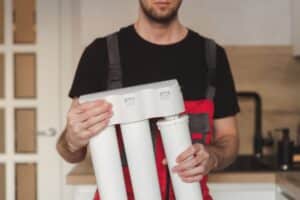
Water Softener Grain Capacity Guide
Choosing the right water softener grain capacity is the most cost-effective way to soften your water. This guide explains what GPG (grains per gallon) means, how to calculate your required grain capacity, and what a resin bed is.
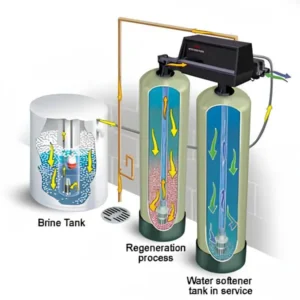
Why Water in the Bottom of Your Water Softener Isn’t Always a Bad Thing
Water in the bottom of your water softener’s brine tank can be normal, especially in wet brine systems where water is necessary for dissolving salt. Understanding the role of the brine tank and how it works can help you determine when water accumulation is typical and when it might indicate a problem.

6 Tips on How to Choose A Water Softener
To choose the right water softener, consider your household size, water usage, water hardness, regeneration method, salt-based vs. salt-free systems, installation, and maintenance needs.
Join Our
Newsletter
Get the latest information, and exclusive offers on water softening and purity solutions
